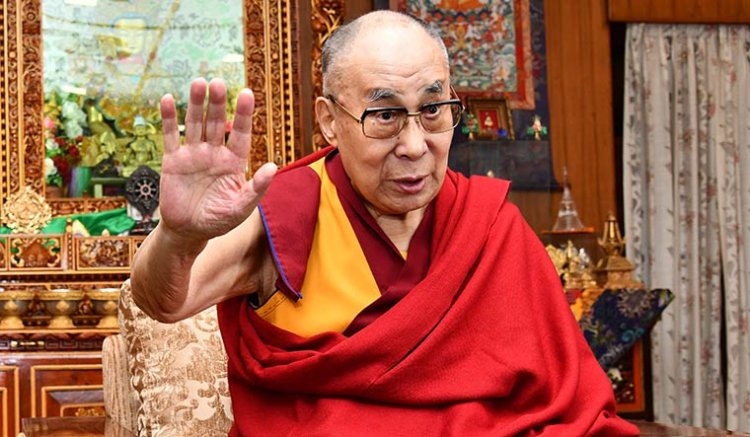The Tussle to Choose the Next Dalai Lama

It has been continuing for years now: The game of authority over the reincarnation of the Dalai Lama.
In fact, five years ago, China said that it will never give up the right to decide on the reincarnation of the Dalai Lama, despite criticism from rights groups and the exiled Tibetan spiritual leader on the issue.
The Dalai Lama and China’s officially atheist Communist Party have repeatedly tussled over who has final authority on this issue of reincarnation.
Tibetans fear that China will use the issue of the Dalai Lama’s succession to split Tibetan Buddhism, with one new Dalai Lama named by exiles and one by the government after his death.
The central government has stiffened its resolve to decide on the reincarnation of “living Buddhas, so as to ensure victory over the anti-separatist struggle”, as said by Zhu Weiqun, chairman of the ethnic and religious affairs committee of the top advisory body to China’s parliament.
China says the Dalai Lama, who fled into exile in India after a failed uprising against Chinese rule in 1959, is a violent separatist. The Nobel Peace laureate denies espousing violence and says he only wants genuine autonomy for Tibet.
*Tibetan Buddhism holds that the soul of a senior lama is reincarnated in the body of a child on his death.
China says the tradition must continue and it must approve the next Dalai Lama. However, the Dalai Lama has said he thinks the title could end when he dies.
Chinese officials, however, have stressed that the current Dalai Lama has no right to abandon reincarnation.
In a commentary, Zhu said the issue “has never been purely a religious matter or to do with the Dalai Lama’s individual rights; it is first and foremost an important political matter in Tibet and an important manifestation of the Chinese central government’s sovereignty over Tibet”.
As the Dalai Lama is the first political leader of Tibet, “whoever has the name of Dalai Lama will control political power in Tibet,” Zhu added.
“For this reason, since historical times, the central government has never given up, and will never give up, the right to decide the reincarnation affairs of the Dalai Lama,” Zhu said.
“It is not only necessary, but is in line with jurisprudence, and has nothing to do with whether the rulers believe in religion or not.”
Rejecting Chinese claim on deciding the Dalai Lama's successor, the United States said that this was an issue that should be taken up in international bodies, including the United Nations.
"There are many people who follow the Dalai Lama and don't live in China. He is a well-known spiritual leader throughout the world and deserves respect and deserves the succession process picked by his faith community...," US Ambassador at Large for International Religious Freedom, Samuel Brownback told reporters at a news conference.
Rejecting the Chinese claim, he reiterated that it was an issue that should be taken up in international bodies.
The United States is going to keep pushing on that, said Brownback who was in Dharamshala and addressed the Tibetan community. Now more of the international community needs to step up and start carrying the cause with him and for him, he said.
Responding to a question, Brownback said the United Nations needs to take this topic of succession of the Dalai Lama.
"I think it should be taken up by the United Nations. It should be taken up by other international bodies too, but the UN should take it up, the European a number of governments...around the world should take this up, he said.
"Particularly, European governments should take this up that care about religious freedom and human rights.... This is something that needs to be addressed at this point in time, Brownback said.
"We know what the Chinese are capable and willing to do because of what they've done to the Panchen Lama. So this we are not going to be surprised what actions they're going to be willing to take. It's just we need to get there ahead of time and address it, he said.
Brownback said it's the Tibetan Buddhists who have the right to determine the succession for the Dalai Lama, not the Chinese Communist Party or any government.
"To me, this is like the Chinese Communist Party, the government, saying they have a right to determine who the next pope is. This is not their right. This is the right of the Tibetan Buddhists to determine this," he asserted.
"The Chinese government has said repeatedly they have this right. You will recall they kidnapped the Panchen Lama.... We don't know if he's dead or alive. And they claim that the succession has to go through them, the Chinese government," he alleged.
The Kidnapping Of Panchen Lama
It is nearly 24 years since the Chinese government kidnapped the Panchen Lama – and groups around the world are calling for Beijing to reveal what has happened to the boy, who would now be 30 years old and the second highest figure in Tibetan Buddhism. If he is still alive.
Groups in India and the US have published portraits of what the Panchen Lama might look like on his 30th birthday and are demanding to know what became of him after he was taken into custody when just six years old.
“Despite China’s claims that he was attending school and leading a normal life, no one has seen or heard from the 11th Panchen Lama, Gedhun Choekyi Nyima since May 17, 1995, the day Beijing took him away as a six-year-old boy and rendered him disappeared ever since,” the Tibetan Bulletin said recently. The bulletin is published by Tibet’s government-in-exile, which is based in India and also represents the Dalai Lama.
Mr Nyima was born in Chinese-controlled Tibet on April 25, 1989. But Beijing does not recognize him as the Panchen Lama.
“The Panchen Lamas and the Dalai Lamas play a significant role in the recognition of each other’s reincarnation when they are in a position to do so, although it is neither mandatory nor indispensable,” a report by the Central Tibetan Administration said.
India’s response
Addressing the United Nations General Assembly last September, Modi said India’s gift to the world was Buddha’s wisdom. By preserving the Buddhist culture and its scriptures from which the reincarnation theory of the Dalai Lama also emanates, India stands to gain as a global spiritual power. It also gives India a strategic advantage over China.
“We must keep in mind that for China, there is no short-term strategy,” said Amitabh Mathur, who was adviser on Tibetan affairs to the Union home ministry till September 2018. “Even its shortest-term strategy looks 30 to 60 years ahead. What we may be preparing for today, China must have prepared for long ago.”
Connection to India
Disguised as a solider, Tenzin Gyatso, the 14th Dalai Lama, fled the Potala Norbulingka palace in Lhasa on March 17, 1959, fearing arrest by an increasingly aggressive Mao Zedong regime. After a fortnight-long trek, the 23-year-old Dalai Lama entered India via Tawang. Prime minister Jawaharlal Nehru granted him political asylum and a Tibetan government-in-exile was established in Dharamshala. The Dalai Lama was the temporal and spiritual head of the Tibetan government till 2011 when he gave up much of his political authority to make way for a democratically elected Central Tibetan Administration (CTA).
The Tibetan Buddhists are clear about the need to ensure that the Dalai Lama’s succession will be undisputed and credible, given the past experience of the Chinese Panchen Lama, the second-highest figure in Tibetan Buddhism.
In the Tibetan Buddhist tradition, besides reincarnation, there could also be an emanation, which means the Dalai Lama can choose his successor during his lifetime. And, this could be a matter of worry for China. Notably, two Dalai Lamas were born outside Tibet-the fourth Dalai Lama was born in 1589 in Mongolia and the sixth Dalai Lama was born in 1682 in present-day Arunachal Pradesh. It raises hope that the next Dalai Lama will be born in the trans-Himalayan region.
The process started way back in 2007 when China issued a set of guidelines on the Dalai Lama’s reincarnation and it continues….. to this very day!















































